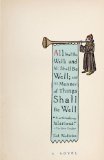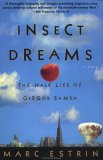Summary | Excerpt | Reading Guide | Reviews | Beyond the book | Read-Alikes | Genres & Themes | Author Bio

Meet Burt Hecker - a mead-drinking, tunic-wearing medieval re-enactor from upstate New York in Tod Wodicka's debut, a modern-day Arthurian quest that introduces one of the most winning oddball characters to come along in years.
Meet Burt Hecker: a mead-drinking, tunic-wearing medieval re-enactor from
upstate New York. He prefers oat gruel to French fries because potatoes were
unavailable in Europe before 1200 AD; and, at war with the modern world, he
enjoys hosting large-scale re-enactments at the Victorian bed and breakfast he
calls home.
But Burt has some serious problems. After an incident involving the New York
State police and an illegally borrowed car, Burt is forced to join a local music
therapy workshop to manage his anger. He gallantly accompanies the group to
Germany for a festival celebrating the music of the visionary saint Hildegard
von Bingen--but he has no plan to return home. His real destination is Prague:
he must find his estranged son Tristan, who, he believes, has lost his way in
the Bohemian city.
As we move between past and present, the tragic details of Burt's life are
gradually revealed: the recent death of his beloved wife; the circumstances that
separate him from his children; his complicated relationship with his
mother-in-law. And we begin to understand, with heart-wrenching clarity, Burt's
eccentric and poignant devotion to a time other than one's own.
Wildly inventive and mesmerizing, Tod Wodicka's debut is a modern-day Arthurian
quest that introduces one of the most winning oddball characters to come along
in years.
Despite light moments and clever demonstrations of culture clash, Wodicka's novel is not a light read. His themes are weighty, his research is thorough and his characters are burdened by their personal and familial histories. Readers may guess that the struggles described in the book's pages are a reflection of its author. Wodicka admits to creating Burt Hecker at least partially out of the need to purge himself of similar tendencies before the birth of his own child. Though Wodicka himself is not a historical re-enactor, he also acknowledges amassing an overwhelming amount of research in preparation for the novel, much if which he never included in the actual text. Only an extremely talented writer could make a success of the mixture of plot, characters and subject matter in All Shall Be Well. Wodicka's story is a rare and noteworthy one, a cautionary tale rooted in a singular, yet familiarly dysfunctional, family...continued
Full Review
 (563 words)
(563 words)
(Reviewed by Stacey Brownlie).
Hildegard von Bingen
Hildegard von Bingen
(1098-1179), whose writings and music are integral to the novel, was trained by an
anchoress named Jutta and, in the book, is one herself. An anchoress is a female hermit – a woman who,
for religious reasons, voluntary shuts herself off from the world. Although
information on Hildegard confirms that she chose to emulate Jutta throughout her
life, it is not clear that she was an anchoress herself. In fact,
considering her achievements include founding two convents in what is now
Germany it seems unlikely she was. What she most certainly was though is a
woman of deep conviction and multiple talents - a
writer, composer, visionary and mystic. Although not ...

If you liked All Shall Be Well; And All Shall Be Well; And All Manner of Things Shall Be Well, try these:

by Jeffrey Eugenides
Published 2003
To understand why Calliope is not like other girls, she has to uncover a guilty family secret, and the astonishing genetic history that turns Callie into Cal. Lyrical and thrilling, Middlesex is an exhilarating reinvention of the American epic.

by Marc Estrin
Published 2003
"This is a grand comic opera starring a meditative cockroach scuttling through the corridors of power at the fulcrum of the 20th century. An impressive debut, notable for a generous sense of fun."